Summary: Tooth extraction may not be the first solution contemplated when addressing dental issues, but it plays a crucial role in promoting overall oral health and improving future dental outcomes. This article delves into the significance of tooth extractions, emphasizing their role in preventing further complications, facilitating effective orthodontic treatments, enhancing the success of dental implants, and ensuring optimal oral hygiene. By understanding the multifaceted benefits of tooth extractions, patients can make informed decisions that contribute to their long-term dental health and aesthetic improvements. Each of these aspects underscores the necessity of timely extractions, ensuring both immediate relief and future dental solutions.
1. Preventing Further Complications

A primary reason for tooth extraction is to prevent further complications that could arise from damaged or diseased teeth. When a tooth is decayed or affected by advanced periodontal disease, it can become a breeding ground for bacteria. This situation can lead to infections that might spread to other teeth, gums, or even systemic health issues. By extracting the problematic tooth, patients can circumvent these risks and protect their overall health.
Moreover, preserving remaining healthy teeth is crucial in dental care. A compromised tooth can exert undue pressure on adjacent teeth, leading to misalignment or additional decay. By removing such a tooth, dental professionals help maintain the integrity of the mouth and reduce the likelihood of future dental procedures.
Additionally, successful management of dental diseases frequently necessitates the removal of infected teeth. This extraction not only allows for the infection to be eradicated but also facilitates healing and recovery, leading to improved oral health overall. Thus, early interventions, including tooth extraction, can significantly enhance long-term health outcomes.
2. Facilitating Effective Orthodontic Treatments
Tooth extraction often plays a vital role in orthodontic treatment plans. For patients requiring braces or aligners, having sufficient space for teeth alignment is essential. When teeth are overcrowded, it can hinder the effectiveness of orthodontic appliances. Extracting one or more teeth can provide the extra space needed for optimal alignment and a more picturesque smile.
Additionally, addressing issues related to jaw alignment and bite discrepancies is crucial in orthodontics. Sometimes, overcrowding in the dental arch can lead to misalignment of the jaw, resulting in issues like temporomandibular joint disorder (TMJ). By extracting strategically selected teeth, orthodontists can work towards achieving a harmonious bite, leading to better function and aesthetics.
Finally, the process of alignment through orthodontics can be long and complex. To achieve the desired outcome, it often becomes necessary to create a more conducive environment, which may require tooth extraction. Patients who understand this relationship can perceive extraction not as a setback but as a vital step towards achieving their orthodontic goals.
3. Enhancing the Success of Dental Implants
Dental implants are a popular solution for replacing missing teeth; however, successful placement can be hindered by existing dental issues. When considering dental implants, previously extracted teeth may pave the way for a seamless transition. The removal of decayed or damaged teeth creates a clean slate for placement, thereby improving the chances of implant success.
Moreover, healthy bone density is essential for the successful placement of an implant. If a tooth has been lost or is heavily damaged, the surrounding bone may have degraded. An extraction can serve as a pivotal point for promoting bone health, allowing for regenerative procedures that ultimately support the implant’s stability and longevity.
Finally, preparing a patient’s mouth for implants often involves a multifaceted approach. Tooth extractions may be part of a larger treatment plan that includes bone grafting or sinus lifts, ensuring that the best environment is created for the new implants. Understanding this interplay can help patients appreciate the critical role of extraction in long-term dental restoration success.
4. Ensuring Optimal Oral Hygiene
Maintaining optimal oral hygiene can become increasingly challenging when dealing with problematic teeth. Impacted wisdom teeth, for instance, can be difficult to clean, leading to plaque accumulation and potential cavities. Extracting these troublesome teeth promotes easier cleaning and maintains overall oral hygiene.
Furthermore, teeth that are extensively decayed can trap food particles, providing a conducive environment for cavities and gum disease to thrive. By removing such teeth, patients can reduce the risk of these complications, consequently leading to better oral care and health.
Lastly, the emotional and psychological aspects of dental health cannot be overlooked. Patients often feel more confident with a healthy smile, which promotes a positive attitude toward oral hygiene practices. Addressing any issues through tooth extraction can foster this feeling of confidence, encouraging patients to maintain their oral hygiene diligently.
Summary:
In conclusion, extracting a tooth is not a mere reactive measure, but a proactive approach that safeguards oral health and contributes to successful future dental solutions. By preventing complications, facilitating orthodontic treatment, enhancing dental implant success, and ensuring optimal hygiene, tooth extractions play an integral part in modern dental care.
As patients navigate their dental journeys, it is essential to recognize the myriad benefits associated with timely extractions, which can lead to improved health outcomes and brighter smiles. Remember, maintaining oral health is a lifelong commitment.
This article is compiled by Vickong Dental and the content is for reference only.
Vickong Dental
Vickong Dental is a large medical group established in Hong Kong in 2008 by professors from well-known medical universities in Guangdong and Hong Kong, as well as medical doctors from key national '985' universities (including Master's supervisors and senior professors). The chain of branches brings together expert dentists with PhDs and Master's degrees from Hong Kong and Mainland China, committed to providing high-quality dental treatment.
"Vickong Dental Practices the University Motto of 'Healing and Serving Society,' with a Stable Operation for Sixteen Years. It Has Been honored with Hong Kong Enterprise Leaders's Choice,' and is a Global Trusted Implant Center for the Nobel Implant System. Recommended by Hong Kong Metro Broadcast and Guangdong Television, it Serves Customers from Over Thirty Countries and Regions, Gaining the Trust and Favor of Citizens from the Guangdong-Hong Kong-Macau Greater Bay Area and Surrounding Cities.

Thousands of customers' unanimous praise
The most recognized and highly recommended dental service by customers in the Guangdong-Hong Kong-Macau Greater Bay Area
We Ensure You Receive Detailed Care and Attention Here
Hong Kong standards, Shenzhen prices, Your Trusted English-speaking dentists

Vickong Dental Medical-Grade Instrument Disinfection Process
Vickong Dental Medical-Grade Instrument Disinfection Process

Vickong Dental Chain: A Warm and Comfortable Environment for Treatment






Appointment Hours

Q&A
Why choose Vickong Dental?
Vickong Dental practices the university motto 「Medicine to Benefit Society」, with each branch bringing together highly qualified dentists with doctoral and master’s degrees from Hong Kong and the Mainland, and has maintained seventeen years of steady operation。Recipient of 「2024 Hong Kong Enterprise Leaders Brand」, 「2025 Hong Kong Enterprise Leaders Brand」, a Nobel Biocare Global Trusted Implant Center, and a brand recommended by Metro Radio Hong Kong and Guangdong TV。
To date, we have served customers from more than thirty countries and regions,earning exceptionally high word-of-mouth recognition and trusted recommendations from residents across the Guangdong-Hong Kong-Macao Greater Bay Area and surrounding cities
We have eight major branches in Zhuhai、Shenzhen,and a consultation and service assurance center in Hong Kong,so you can book a free consultation at any time for any questions,which is very reassuring.
If I do not accept the quotation after the CT scan, will I be charged??
No! As long as the actual treatment has not started, you will not be charged any fees.
Will there be any additional charges during the treatment process?
No, there won’t be any additional charges. Before treatment begins, we will clearly explain the treatment plan and its corresponding fees. Only after the patient agrees and signs the consent form will we proceed with the dental service.
Can I pay in Hong Kong dollars?
Yes. Vickong Dental accepts payment in Hong Kong dollars. The amount will be converted based on the exchange rate of the day, and the applicable rate will be clearly communicated to you in advance.
Can I reschedule my appointment at any time?
Yes. Please contact us via **WeChat** or **WhatsApp** as early as possible, providing your original appointment time and details, along with your preferred new date and time slot for rescheduling.













